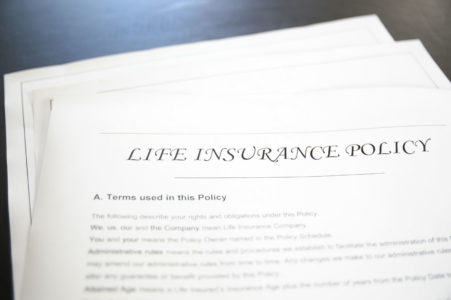Can you get a life insurance policy on your ex-husband?

Free Life Insurance Comparison
Compare Quotes From Top Companies and Save
Secured with SHA-256 Encryption
Heidi Mertlich
Licensed Life Insurance Agent
Heidi works with top-rated life insurance carriers to bring her clients the highest quality protection at the most competitive prices. She founded NoPhysicalTermLife.com, specializing in life insurance that doesn’t require a medical exam. Heidi is a regular contributor to several insurance websites, including FinanceBuzz.com, Insurist.com, and Forbes. As a parent herself, she understands the ...
Licensed Life Insurance Agent
UPDATED: Dec 4, 2023
It’s all about you. We want to help you make the right life insurance coverage choices.
Advertiser Disclosure: We strive to help you make confident life insurance decisions. Comparison shopping should be easy. We are not affiliated with any one life insurance provider and cannot guarantee quotes from any single provider.
Our life insurance industry partnerships don’t influence our content. Our opinions are our own. To compare quotes from top life insurance companies please enter your ZIP code on this page to use the free quote tool. The more quotes you compare, the more chances to save.
Editorial Guidelines: We are a free online resource for anyone interested in learning more about life insurance. Our goal is to be an objective, third-party resource for everything life insurance-related. We update our site regularly, and all content is reviewed by life insurance experts.
UPDATED: Dec 4, 2023
It’s all about you. We want to help you make the right life insurance coverage choices.
Advertiser Disclosure: We strive to help you make confident life insurance decisions. Comparison shopping should be easy. We are not affiliated with any one life insurance provider and cannot guarantee quotes from any single provider.
Our life insurance industry partnerships don’t influence our content. Our opinions are our own. To compare quotes from top life insurance companies please enter your ZIP code on this page to use the free quote tool. The more quotes you compare, the more chances to save.
On This Page
- You can get a life insurance policy on an ex-spouse.
- Many divorce agreements stipulate that the spouses need to have life insurance for the benefit of the children or the dependent spouse.
- It’s important to understand your options when it comes to the ownership of the policy.
You can get a life insurance policy on your ex-husband or on your ex-wife. In fact, many divorce decrees specify that the ex-spouses must have life insurance on themselves, with the ex-spouse named as the beneficiary.
Alternatively, each ex-spouse could own a policy on the other ex-spouse. There are a number of factors to consider when purchasing a life insurance policy on an ex-spouse.
Learn more about insuring your ex and make sure to use our free quote tool above to see what life insurance is best for you!
Why Exes Need Life Insurance

The main purpose of life insurance is to replace income that is lost because someone dies.
If you depend on your ex-spouse for income, whether it is alimony or child support, their death would have a negative financial impact on you, just as it would have if your spouse had died while you were married.
In order to provide for your children or a dependent spouse, your divorce agreement may require that you and/or your ex-spouse have a life insurance policy. The agreement may also state who will own the policy and who the beneficiaries will be.
Make sure that you understand these stipulations so that you get the right policy to keep you in compliance with your agreement.
Understand that you cannot take out a life insurance policy on your ex-spouse or anyone else, for that matter without their consent.
The person who is being insured has to provide information on their medical history and they must sign the policy application. You may be required to demonstrate that the death of the person you are insuring would have a negative financial impact on you.
Enter your zip code below to view companies that have cheap life insurance rates.
Secured with SHA-256 Encryption
Ownership of the Policies

A life insurance policy is a contract between the insurance company, or carrier, and the owner of the policy.
The contract states that assuming that premiums are paid in a timely manner by the owner, the insurance company will pay the beneficiaries a death benefit on the death of the insured.
Let’s take a look at each of the parties to the contract.
The insurance company issues the policy. They assess the probable life expectancy of the insured, based on their medical and family history and some assumptions they make about longevity.
This is called underwriting. They determine how much the premium will be and they collect the premium from the owner.
The owner is the person who owns the policy and is responsible for paying the premiums. The owner has to have insurable interest in the insured in order to be able to purchase a life insurance policy on the insured.
Insurable interest means that the owner would have to be negatively impacted in some financial way if the insured died. If a divorced spouse is ordered to pay alimony or child support, that support would stop if the ex-spouse who is paying it died.
The ex-spouse who was receiving the child support or alimony would be negatively impacted financially, so they have insurable interest in the ex-spouse.
The owner has the ability to make changes to the policy, such as changing the beneficiary, reducing the death benefit and withdrawing or borrowing money, in the case of a permanent policy.
Keep this in mind when you decide whom should own the life insurance policy that is going to protect your alimony or child support.
The insured is the person whose death would cause the policy to pay out the death benefit. The insured needs to sign the application, provide the medical history and undergo any tests that are required by underwriting.
The beneficiary is the person to whom the death benefit is paid when the insured dies. If you are taking out a life insurance policy on your ex-spouse to protect your alimony or child support, you probably want to name yourself as the beneficiary.
If you are taking out a policy on yourself, keep in mind that the beneficiary can do whatever they want with the proceeds from an insurance policy.
If the money is to be used for the benefit of your children, it’s best to specifically state that in the divorce agreement.
If you truly do not trust that your ex-spouse will use the money to benefit your children should you die, you can set up a trust that is administered by a third-party. The trust can be the beneficiary of your life insurance policy, and it can specify how the money is to be used.
Which Type of Life Insurance is Best?

When taking out a life insurance policy on an ex-spouse, it’s important to get the right kind of insurance.
Term insurance provides a coverage for a fixed period of time, or term. If you are purchasing a policy to ensure that child support payments are made even if your ex-spouse dies, term insurance may be your best choice.
Term insurance typically provides a lot of coverage for a relatively low premium payment, since it is only in force for the length of the term. Choose a term that coincides with the duration of your child support payments.
For example, if your children are 12 and 14 years old and your child support agreement says that your ex-husband has to pay support until the youngest is 22, you could get a 10-year term policy.
Permanent life insurance is intended to provide coverage for the rest of your life. It is more expensive than term insurance, but it sometimes builds cash value.
It’s important to understand that the cash value is an asset of the owner until the policy pays out. The owner can withdraw the cash value, borrow against it, or use it to pay the premiums.
If there is cash value in the policy at the time the insured dies, the death benefit may be higher than the face amount of the policy to account for the cash value. For example, suppose you take out $100,000 permanent life insurance policy on your ex-husband.
You pay the premiums for twenty years. By now, there is $10,000 in cash value in the policy. As the owner of the policy, you can withdraw the cash value and use it for whatever you want.
You can also take out a loan of some or all of the cash value, and pay it back over time. If you leave the cash value in the policy and your husband dies, in most cases, the beneficiaries will get $100,000 plus the $10,000 in cash.
Some policies specify that some of all of the cash value is retained by the insurance company, so check the fine print of your policy.
There are two kinds of permanent insurance: whole life and universal life. Whole life is the most expensive, but accrues the most cash value.
Some whole life policies are designed so that you pay the premiums for a certain number of years and then the cash value is used to pay the premium. Universal life insurance is permanent but less expensive than whole life.
It builds cash value, but it does so more slowly than whole life insurance, and the amount of cash value is tied to interest rates, in the case of universal life, or the rate of return of mutual funds, in the case of variable universal life insurance.
Determining the right kind of life insurance to buy on your ex-spouse is important.
If you are buying the policy in order to ensure that your children are provided for, term life is probably your best bet because you will only need the coverage for as long as your children are still dependent on you and your ex-spouse for support.
Once they are supporting themselves, you won’t need the coverage and you can stop paying for it. If you are buying life insurance in order to ensure that your alimony continues even if your ex-spouse dies, a permanent policy may make more sense.
Make Sure Your Policy is Compatible with Your Divorce Decree

If your divorce agreement specifies that you must have life insurance, you are obligated to have a policy and keep it in force. The same goes for your ex-spouse.
Consider whether you are willing to trust that your ex-spouse will obtain the correct amount and type of insurance and whether they will keep the policy in force by paying the premiums.
If you are not confident of your ex-spouse’s willingness or ability to pay the policy premiums, owning their policy yourself is a good idea. You may want to have the ownership requirement written into your divorce agreement.
Your divorce agreement should also state how much insurance is required and for how long a period of time. Determining the correct face amount can be tricky, but your attorney should be able to help.
You will need to calculate the total amount of child support or alimony you are likely to receive, and then adjust it based on inflation.
Life insurance policies should be included in the part of the divorce agreement that concerns remarriage. If alimony ends when a spouse remarries, the requirement for life insurance should end as well.
Child support usually continues until the child reaches the age of majority or graduates from college, so life insurance to protect child support usually ends at that point as well.
If you have any special circumstances that are addressed in the divorce agreement, make sure that the life insurance policies are not in conflict with those as well.
For example, if you have a child with special needs who may be dependent on you and your ex-spouse into adulthood, the life insurance policies you choose should provide protection for that situation as well.
There are many situations in which it is a smart idea to take out a life insurance policy on an ex-spouse. It can provide important protection for you and those who depend on you, so it’s critical to make sure you understand how to choose and purchase the best policy for your specific situation.
Don’t forget to use our free comparison quote tool below and start comparing rates today!
- http://www.americanbar.org/newsletter/publications/law_trends_news_practice_area_e_newsletter_home/l
- https://www.insurancelibrary.com/life-insurance/who-are-the-legal-parties-to-a-life-insurance-contract
- http://www.insureuonline.org/consumer_life_faqs.htm
- http://www.iii.org/article/what-are-principal-types-life-insurance
- http://www.iii.org/article/what-are-different-types-term-life-insurance-policies
- http://www.iii.org/article/what-are-different-types-permanent-life-insurance-policies
- https://www.findlaw.com/family/child-support/what-does-child-support-cover.html
- https://www.nolo.com/legal-encyclopedia/alimony-what-you-need-know-30081.html
Enter your zip code below to view companies that have cheap life insurance rates.
Secured with SHA-256 Encryption
Heidi Mertlich
Licensed Life Insurance Agent
Heidi works with top-rated life insurance carriers to bring her clients the highest quality protection at the most competitive prices. She founded NoPhysicalTermLife.com, specializing in life insurance that doesn’t require a medical exam. Heidi is a regular contributor to several insurance websites, including FinanceBuzz.com, Insurist.com, and Forbes. As a parent herself, she understands the ...
Licensed Life Insurance Agent
Editorial Guidelines: We are a free online resource for anyone interested in learning more about life insurance. Our goal is to be an objective, third-party resource for everything life insurance-related. We update our site regularly, and all content is reviewed by life insurance experts.